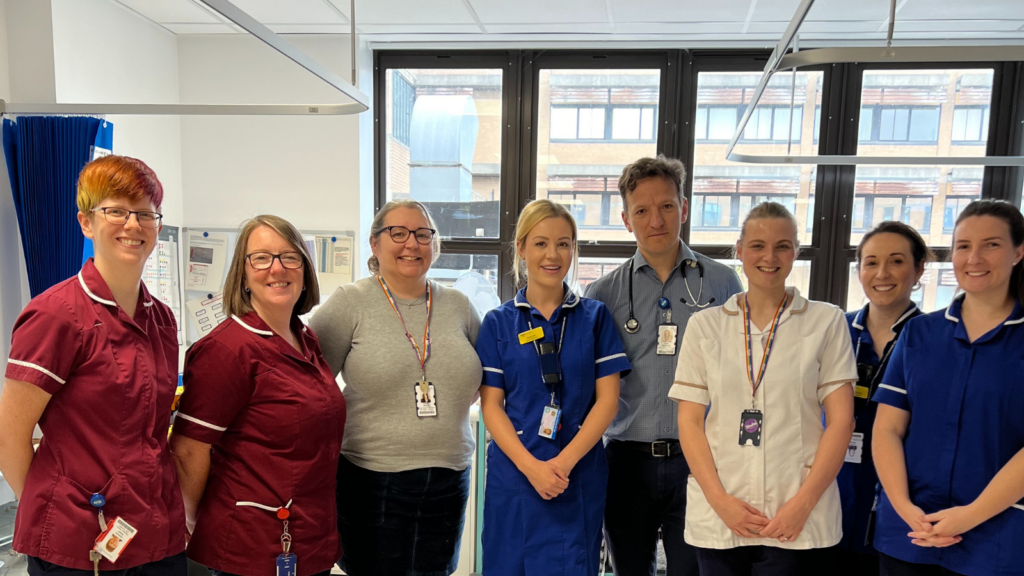Today (29 October) is World Stroke Day, so we’re taking the opportunity to shine a spotlight on how research and clinical teams work together to bring clinical trials to stroke patients.
Research at the hyper acute stroke unit at the Royal Victoria Infirmary (RVI) is led by Dr Anand Dixit, consultant physician in stroke, with Dr Sofia Dima as the unit’s clinical lead.
The unit is one of the few selected national centres capable of providing complex stroke research interventions for eligible patients who have suffered a stroke.
Dr Tudor Gheorghiu has been a consultant physician on the stroke unit for six years. He has recently taken on his first clinical trial and is the principal investigator for the FASTEST trial. Here, he tells us more about stroke research.
The role of research in stroke
Our stroke team at the RVI integrates research into the heart of its clinical practice.
Time is truly of the essence when it comes to treatment for stroke. We have a very small window to work within, so our team pulls together as much information as possible before the patient has even arrived to give them the best opportunities for treatments.
Clinical trial success
Newcastle was one of 39 stroke centres to take part in the ATTEST2 trial, which compared a medicine called Tenecteplase with a current treatment, Alteplase.
Results of the trial, published last year, showed that Tenecteplase was just as effective as Alteplase, but can be administered quicker through a single injection. Thanks to the trial, we are now able to give our patients Tenecteplase as standard care.
Being a principal investigator
I have always had an interest in research, and I am delighted to be leading my first trial, called FASTEST, as principal investigator.
FASTEST (rFVIIa for Acute Hemorrhagic Stroke Administered at Earliest Time) is a global study which explores a new type of drug designed to encourage the blood to clot and stop further bleeding in the brain.
The challenge is that this treatment must be given within two hours of symptoms starting. When we opened, we set a target of two to three patients which we thought would be challenging, given some patients don’t arrive at the unit within a two-hour timeframe.
Other countries have mobile stroke units, which are essentially ambulances with CT scanners, meaning that a bleed can be treated before a patient arrives to hospital. In the UK, time constraints are greater because treatment can only be given in a hospital.

Testament to team work
Our clinical and research staff work together to ensure anyone who meets the criteria can be offered a place on the FASTEST trial, 24 hours a day, seven-days-a-week.
As a result of this dedication, Newcastle is now the lead recruiting site in Europe and 12th worldwide at the time of writing, enrolling ten patients over the last 18 months.
We are fortunate to have actively involved specialist stroke nurses and research nurses on the unit. Our research nurses – Michelle and Vicky- have been vital to the success of the trial to date. Michelle even came into work out of hours just to make sure a patient could take part.
Beth Holland, clinical trials officer, Susan Reece, study support assistant, and data manager, Julie Parker, also played a huge role in helping get the trial up and running.
Stroke can have a devastating impact on patients and their families. We hope clinical trials like FASTEST can help develop new, better treatments and improve quality of life for our patients.
What to do if someone is having a stroke
Stroke is a medical emergency. If you experience any of the symptoms below, you should call 999.
How to identify a stroke
The FAST acronym (Face, Arms, Speech, Time) is a test to quickly identify if someone is having a stroke.
- Face weakness: Can the person smile? Has their mouth or eye drooped?
- Arm weakness: Can the person raise both arms?
- Speech problems: Can the person speak clearly and understand what you say?
- Time to call 999: if you see any of these signs.
Acting FAST will give the person having a stroke the best chance of survival and recovery. Always call 999 straight away.
Ambulance paramedics are trained in stroke and will ensure the person receives emergency medical care and specialist treatment.
Other symptoms of a stroke
The FAST test helps spot the three most common symptoms of stroke. But there are other signs that you should always take seriously. These include:
- Sudden weakness or numbness on one side of the body, including legs, hands or feet.
- Difficulty finding words or speaking in clear sentences.
- Sudden blurred vision or loss of sight in one or both eyes.
- Sudden memory loss or confusion.
- Dizziness or a sudden fall.
- A sudden, severe headache.
If you spot any of these signs of a stroke, don’t wait. Call 999 straight away.
Source: Stroke Association
